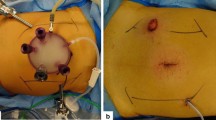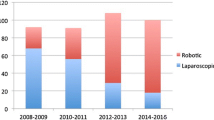Abstract
The open surgeries and more recently minimal invasive surgeries aided by laparoscopic or robotic approaches are employed for rectal cancer treatment procedures. The open approach is the most commonly opted technique, but recent studies have also shown that laparoscopic total mesorectal excision (TME) has become the standard of care. There are certain shortcomings of laparoscopic surgery such as long learning curve, inadequate counter traction, limited dexterity, lack of tactile feedback and limited two-dimensional visions. Robotic surgery also offers several benefits to overcome the drawbacks of laparoscopic procedures, such as providing better dexterity and a more stable visualization. This study aims to analyse the surgical results in terms of completion of TME, short-term surgical outcomes and hospital stay in after open, laparoscopic- and robotic-assisted rectal resections respectively. A retrospective review of prospectively maintained database of patients operated for carcinoma rectum between January 2013 and August 2018 at Manipal Comprehensive Cancer Centre, Manipal-Vattikuti Institute of Robotic Surgery, Bangalore, was analysed in this study. The surgical parameters like completion of total mesorectal excision; proximal, distal and circumferential resection margins; number of nodes retrieved; and total post operative hospital stay were analysed in the open, laparoscopic-assisted and robotic-assisted groups. A total of 100 patients were included in the study consisting of 25, 25 and 50 patients each in the open, laparoscopic and robotic arms respectively. In case the desired results were not obtained using the advanced technique the procedure was converted and open technique was adopted. The conversion rate to open procedure was 8% (2of 25) in the laparoscopic-assisted group and 2% (1/50) in the robotic-assisted group. The average post operative hospital stay was 7.4, 7.36 and 6 days in the open, laparoscopic- and robotic-assisted group (p = 0.01) respectively. Robotic rectal resections show a trend towards better surgical results in the form of improved circumferential resection margins, completeness of TME and lower conversion rates.

Similar content being viewed by others
References
Baik SH, Gincherman M, Mutch MG, Birnbaum EH, Fleshman JW (2011) Laparoscopic vs open resection for patients with rectal cancer: comparison of perioperative outcomes and long-term survival. Dis Colon Rectum 54(1):6–14
Avital S, Hermon H, Greenberg R, Karin E, Skornick Y (2006) Learning curve in laparoscopic colorectal surgery: our first 100 patients. Isr Med Assoc J 8(10):683–686
Mangano A, Valle V, Fernandes E, Bustos R, Gheza F, Giulianotti PC (2018) Operative technique in robotic rectal resection. Minerva Chir
Guillou PJ, Quirke P, Thorpe H, Walker J, Jayne DG, Smith AMH, Heath RM, Brown JM (2005) Short-term endpoints of conventional versus laparoscopic-assisted surgery in patients with colorectal cancer (MRC CLASICC trial): multicentre, randomised controlled trial. Lancet 365(9472):1718–1726
Bonjer HJ, Deijen CL, Abis GA, Cuesta MA, van der Pas MHGM, de Lange-de Klerk ESM, Lacy AM, Bemelman WA, Andersson J, Angenete E, Rosenberg J, Fuerst A, Haglind E, COLOR II Study Group (2015) A randomized trial of laparoscopic versus open surgery for rectal cancer. N Engl J Med 372(14):1324–1332
Trastulli S, Farinella E, Cirocchi R, Cavaliere D, Avenia N, Sciannameo F et al (2012) Robotic resection compared with laparoscopic rectal resection for cancer: systematic review and meta-analysis of short-term outcome. Color Dis 14(4):e134–e156
Luca F, Valvo M, Ghezzi TL, Zuccaro M, Cenciarelli S, Trovato C, Sonzogni A, Biffi R (2013) Impact of robotic surgery on sexual and urinary functions after fully robotic nerve-sparing total mesorectal excision for rectal cancer. Ann Surg 257(4):672–678
Baek SK, Carmichael JC, Pigazzi A (2013) Robotic surgery: colon and rectum. Cancer J 19(2):140–146
Brown G, Daniels IR (2005) Preoperative staging of rectal cancer: the MERCURY research project. Recent Results Cancer Res 165:58–74
Sauer R, Becker H, Hohenberger W, Rödel C, Wittekind C, Fietkau R, Martus P, Tschmelitsch J, Hager E, Hess CF, Karstens JH, Liersch T, Schmidberger H, Raab R, German Rectal Cancer Study Group (2004) Preoperative versus postoperative chemoradiotherapy for rectal cancer. N Engl J Med 351(17):1731–1740
van der Pas MH, Haglind E, Cuesta MA, Fürst A, Lacy AM, Hop WC, Bonjer HJ, COlorectal cancer Laparoscopic or Open Resection II (COLOR II) Study Group (2013) Laparoscopic versus open surgery for rectal cancer (COLOR II): short-term outcomes of a randomised, phase 3 trial. Lancet Oncol 14(3):210–218
Jeong S-Y, Park JW, Nam BH, Kim S, Kang S-B, Lim S-B, Choi HS, Kim DW, Chang HJ, Kim DY, Jung KH, Kim TY, Kang GH, Chie EK, Kim SY, Sohn DK, Kim DH, Kim JS, Lee HS, Kim JH, Oh JH (2014) Open versus laparoscopic surgery for mid-rectal or low-rectal cancer after neoadjuvant chemoradiotherapy (COREAN trial): survival outcomes of an open-label, non-inferiority, randomised controlled trial. Lancet Oncol 15(7):767–774
Nagtegaal ID, Marijnen CAM, Kranenbarg EK, van de Velde CJH, van Krieken JHJM (2002) Pathology Review Committee, et al. Circumferential margin involvement is still an important predictor of local recurrence in rectal carcinoma: not one millimeter but two millimeters is the limit. Am J Surg Pathol 26(3):350–357
Birbeck KF, Macklin CP, Tiffin NJ, Parsons W, Dixon MF, Mapstone NP, Abbott CR, Scott N, Finan PJ, Johnston D, Quirke P (2002 Apr) Rates of circumferential resection margin involvement vary between surgeons and predict outcomes in rectal cancer surgery. Ann Surg 235(4):449–457
Sun Y, Xu H, Li Z, Han J, Song W, Wang J et al (2016) Robotic versus laparoscopic low anterior resection for rectal cancer: a meta-analysis. World J Surg Oncol 1:14 Available from: https://www.ncbi.nlm.nih.gov/pmc/articles/PMC4772524/
Baxter NN, Morris AM, Rothenberger DA, Tepper JE (2005 Feb 1) Impact of preoperative radiation for rectal cancer on subsequent lymph node evaluation: a population-based analysis. Int J Radiat Oncol Biol Phys 61(2):426–431
Wong SL (2009) Lymph node counts and survival rates after resection for colon and rectal cancer. Gastrointest Cancer Res GCR 3(2 Suppl 1):S33–S35
Liao G, Li Y-B, Zhao Z, Li X, Deng H, Li G (2016) Robotic-assisted surgery versus open surgery in the treatment of rectal cancer: the current evidence. Sci Rep 27:6 Available from: https://www.ncbi.nlm.nih.gov/pmc/articles/PMC4882598/
Somashekhar SP, Ashwin KR, Rajashekhar J, Zaveri S (2015 Dec) Prospective randomized study comparing robotic-assisted surgery with traditional laparotomy for rectal cancer—Indian study. Indian J Surg 77(Suppl 3):788–794
Pucci MJ, Beekley AC (2013 Mar) Use of robotics in colon and rectal surgery. Clin Colon Rectal Surg 26(1):39–46
Author information
Authors and Affiliations
Corresponding author
Additional information
Publisher’s Note
Springer Nature remains neutral with regard to jurisdictional claims in published maps and institutional affiliations.
Key Message
Robotic rectal resections show a trend towards better surgical results in the form of improved circumferential resection margins, completeness of TME and lower conversion rates.
Electronic supplementary material
ESM 1
(DOCX 19 kb)
Rights and permissions
About this article
Cite this article
Somashekhar, S.P., Deshpande, A.Y., Ashwin, K.R. et al. Comparative Evaluation of the Short-Term Treatment Outcomes Between Open, Laparoscopic- and Robotic-Assisted Surgical Approaches for Rectal Cancer Treatment. Indian J Surg Oncol 11, 649–652 (2020). https://doi.org/10.1007/s13193-020-01137-z
Received:
Accepted:
Published:
Issue Date:
DOI: https://doi.org/10.1007/s13193-020-01137-z




